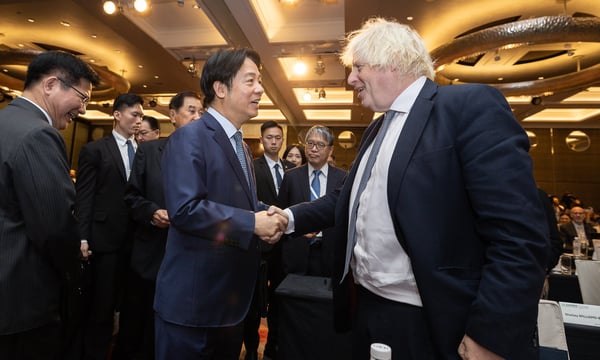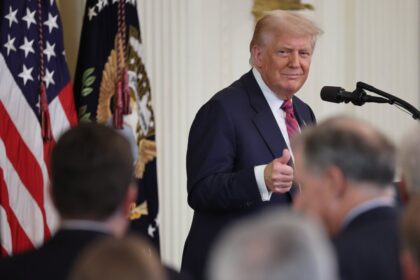On August 5, former British Prime Minister Boris Johnson became only the third former British leader to visit Taiwan, after Margaret Thatcher’s visit in 1992 and Liz Truss’ in 2023. From Taipei, he called for the United Kingdom and other European nations to strengthen political and economic ties with Taiwan, arguing that the U.K. and Taiwan are “two island democracies” bound by shared values.
Johnson’s visit has drawn perhaps predictable scorn given the terminal trajectory of his political career, the suggestion that Johnson received a large fee for the speech, and the characteristically eclectic nature of his address, which covered – among other things – Peloton, ChatGPT, Din Tai Fung and, of course, Scottish whisky. However, Johnson is far closer to Thatcher than Truss when it comes to British political heavyweights, perhaps the most prominent British politician since Tony Blair. Most importantly in the context of Taiwan, what remains of his political legacy is tied to the role he, and Britain, played in rallying support for Ukraine following Russia’s invasion in February 2022.
In the all too fleeting moments of clarity within his speech, Johnson drew parallels to Russia’s invasion of Ukraine and Taiwan’s plight in the face of omnipresent Chinese pressure, a comparison that is symbolic given it comes from the man who spearheaded Europe’s response in February 2022. Indeed, unlike Taipei’s misstep in inviting the ever-wilting Liz Truss in 2023, Johnson’s presence last week could pay dividends for Taiwan’s international presence should Johnson defy his critics once again and secure a return to front-line British politics, as some have predicted.
Indeed, despite the low ebb Johnson presented in his speech, his capacity to secure his damaged legacy by tying it to Ukraine’s security, and his decision to include Taiwan’s security in his decision to cling to political relevancy should encourage Taiwan’s Ministry of Foreign Affairs. Taiwan is increasingly seen by Western politicians, like Johnson, as a quintessential cornerstone in the fight for democracy amid a global resurgence of autocracy.
Moreover, Johnson’s visit further underscores the growing importance of Taiwan as an issue in British foreign policy. 2025 has seen a palpable uplift in British-Taiwanese engagement, where the U.K. has made a concerted effort to raise Taiwan’s profile and plight internationally. This policy was made explicit by Britain’s outgoing representative to Taipei, John Dennis, in February. Indeed, British Prime Minister Keir Starmer has raised Taiwan in a number of official meetings with fellow heads of state, with Taiwan cited in the official statements issued following meetings with New Zealand’s Prime Minister Christopher Luxon in London in April and with French President Emmanuel Macron in July.
Furthermore, the security of Taiwan and the impact an escalation in the Taiwan Strait would have on British security and stability was a key consideration in a British Security command paper released in June. That document explicitly outlined the importance of Taiwan in global supply chains and trade and committed Britain to strengthening ties with Taiwan “underpinned by shared democratic values.” The passage of the Royal Navy vessel HMS Spey through the Taiwan Strait on June 19 underpinned London’s commitment, with Foreign Secretary David Lammy seemingly committing to an upgraded British naval presence in the region when pressed in the Commons.
Moreover, Britain’s increasing commitment to Taiwan was further outlined by Lammy’s cabinet colleague, Defense Secretary John Healey, who declared that the U.K. was “ready to fight” alongside Australia when asked by The Telegraph how the British government was supporting Taiwan. The paper claimed it was the “among the most robust [comments] from a British representative” regarding a potential cross-strait conflict. While Healey rowed back on the statement, claiming to be speaking in general terms, his statement was a further signal that in the highest echelons of British government Taiwan, and its security, is an increasingly prominent and pressing concern.
British government policy on Taiwan has long lagged behind, while being heavily influenced by, Parliament. Indeed, the influential Foreign Affairs Select Committee in 2023 argued that Taiwan “is already an independent country.” Furthermore, it was consistent parliamentary scrutiny of China’s crackdown on civil liberties in Hong Kong that instituted a renewed concern for the plight of Taiwan, and as a result a flurry of parliamentary visits have sought to embolden ties between Taiwanese and British politicians.
Two British delegations have visited Taipei already this year, in February and May, while eminent former Taiwanese President Tsai Ing-wen visited Parliament on May 20, delivering a speech in the House of Lords calling on Britain to work alongside Taiwan in the “defense of freedom and democracy.” Similarly to Boris Johnson’s visit to Taipei, Tsai’s visit to London symbolized a growing appetite for British-Taiwanese engagement. Indeed, Tsai – as Taiwan’s first female president – throughout her two terms in office drew the most British media coverage of any Taiwanese political figure since Chiang Kai-shek. As such, the symbolism of her invite and subsequent visit to Parliament served as a tangible example of deepening parliamentary-level support for Taiwan among British politicians.
Finally, in the midst of his references to Johnnie Walker, the First Island Chain, and the ominous shadow of 2027, Boris Johnson toward the end of his speech argued that British support was also “quite frankly for economic reasons.” To seasoned British and Taiwanese diplomats such a claim would be unsurprising. Michael Reilly, a former British representative to Taipei turned academic at the University of Nottingham, argued that British engagement with Taiwan had for much of the 20th century been “essentially neo-mercantilist.” According to Reilly, Taiwanese officials were long treated like “pariahs” by British officials, who strenuously avoided any dialogue that veered away from trade toward politics.
Economic engagement remains central to British discourse toward Taiwan. Even discussion of Taiwan’s security is frequently framed around Taiwan’s role in global supply chains, while the only “official” engagement between London and Taiwan this year has been a slew of new “pillars” signed as part of the 2023 Taiwan-U.K. Enhanced Trade Partnership. Junior Minister Douglas Alexander visited Taipei to sign the agreement in June.
However, crucially, where British talk of Taiwan has been almost exclusively economic in nature for much of the history of British engagement with Taiwan, 2025 underscores that this is no longer the case. During a meeting with President Lai Ching-te in the Presidential Office in Taipei, Alexander was happy to discuss Taiwan’s security and Britain’s “commitment to peace and stability in the Taiwan Strait.”
Such a willingness to discuss Taiwan’s security was notably absent in the readouts that had accompanied previous trade ministers’ visits to Taiwan, such as by Stephen Green in 2011, Graham Stuart in 2018, and in both of Greg Hands’ visits in 2016 and 2022. As such, while economic exchange is a vital part of British engagement with Taiwan, it is increasingly entwined with a growing recognition in London that Taiwan’s security and stability is essential to British foreign policy.
Johnson’s rambling speech will not take its place in the pantheon of prose in British statesmanship alongside his hero Winston Churchill’s proclamations on the growing divide between democracy and autocracy. Yet his address still matters, for it showcases the increasing importance attached to Taiwan within British foreign policy discourse. Johnson remains a force in British politics and it’s telling that he, like the Labor government, no longer sees avoiding the “Taiwan issue” as a viable option to avoid angering China. As Taiwan-U.K. engagement in 2025 underscores, Taiwan is part of the main in British foreign policy discourse, no longer merely one half of “a quarrel in a faraway country.”






